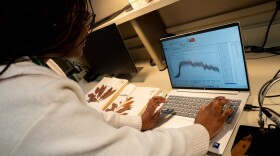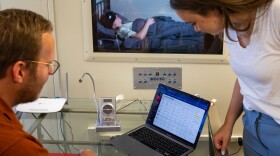-
An anonymous $14 million grant to the Missouri Botanical Garden is prompting scientists there to look at their herbarium collection in new ways, taking their cues from the stars.
-
In "Footeprint," out today, Lindsay Metcalf resurrects the history of Eunice Newton Foote, a 19th-century scientist who discovered carbon dioxide’s heat-trapping properties while fighting for women’s place in science.
-
Dr. Westley Youngren, an assistant professor of psychology at the University of Missouri-Kansas City, is researching ways to treat nightmares caused by trauma or PTSD.
-
A data center in the Crossroads is one of the first in the country to get a loan for clean energy. Plus: Scientists across the central U.S. say they have experienced a year of change and uncertainty under the second Trump administration.
-
A huge tree is being cut down in Kansas City's Historic Northeast. The burr oak predates even the Revolutionary War and survived as the city sprang up around it. But after a lightning strike and years of disease, Frank the Liberty Tree has reached its end.
-
Scientists in the middle of the country told Harvest Public Media that 2025 was a year of major changes and uncertainty.
-
After the state's education department oversaw a pilot program teaching science through agriculture, lawmakers saw an opportunity for more.
-
The Trump administration has cut more than $1 billion in National Science Foundation grants, but the campus in Rolla is still winning awards — for now.
-
Olympic gold medalist Katie Ledecky ditched her swimming cap for a lab coat to teach USD 232 students about careers in science, technology, engineering, art and math, or STEAM.
-
The turtle was found off the coast of Virginia after ingesting a fishhook and won't be released to the wild because of arthritis in her front flippers.
-
University of Missouri researchers have genetically engineered plants to produce more oil and protein, paving the way for more efficient, sustainable biofuels that don't compete with food crops.
-
Scientists in a Columbia, Missouri, lab have studied how toxic chemicals affect animals and ecosystems since the 1960s. But President Trump's proposed budget would likely mean lights out. Plus: Hydroelectric power is a mainstay of the United States electrical grid, but federal hurdles could take plants offline.
Play Live Radio
Next Up:
0:00
0:00
Available On Air Stations










